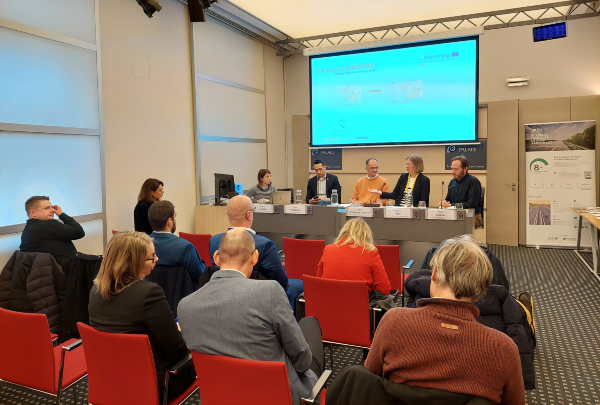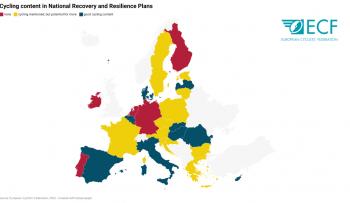
SABRINA Project presents results in Brussels
Interreg Europe project hosts event in Brussels to showcase results and findings to EU-level representatives, including MEP Vlad Gheorghe of the TRAN Committee.
On 5 December 2022, the SABRINA Project, an Interreg Europe project for Safer Bicycle Routes in the Danube Area, hosted a co-organised event in Brussels with the European Cyclists’ Federation (ECF). The event presented the project’s key lessons and recommendations for improving cycling infrastructure at the EU-level to representatives of the EU Commission, EU Parliament, civil society organisations and professionals.
In his opening remarks, Rob McInerney, CEO of the International Road Assessment Programme (iRAP), stressed that, “sustainable mobility is first and foremost safe mobility”, before emphasising that the tools developed as part of the SABRINA – SAFER CYCLING ROUTES TOOLKIT (SCRT), as well as iRAP’s CyclRAP programme, help professionals as well as decisionmakers to reach their safety goals.
Philip Amaral, Policy and Development Director of ECF, asserted, “We need the EU to raise the level of cycling across the continent through a cohesive strategy that funds and implements cycling infrastructure. We need all European governments to promote cycling as a way to reduce transport emissions and achieve other societal benefits, such as reducing air and noise pollution. Cycling must be integrated as a fully-fledged mode of transport."

Project partners discuss results (Source: SABRINA Project)
Presentations by project partners Marko Ševrović Ph.D of the European Institute of Road Assessment (EIRA), Anđelo Marunica and Leonid Ljubotina of the Faculty of Transport and Traffic Sciences of University of Zagreb (FAZ), and Aneja Roze of the Municipality of Ilirska-Bistrica (OIB) showcased the project’s Best Practice Report, 30 factsheets on Risk, Effects and Solutions for safer cycling infrastructure, and the Safer Cycling Routes Toolkit (SCRT). This then opened up a discussion of SABRINA’s results and their implications for integrated cycling into the EU’s key policies and funding streams.
To reach our common goal of more cycling, more often, on safe cycling infrastructure, MEP Vlad Gheorghe of the TRAN Committee encouraged cycling advocates to put more pressure on the EU institutions. “Politicians are sensitive to the vocal and augmented voices of the civil society, therefore projects as SABRINA, can truthfully support the cause by offering important responses for decisionmakers”.
Pedro Homem de Gouveia of POLIS Network underlined the importance of know-how transfer, education and the formation of actual and future road and urban planners in the sense of fully integrating cycling as a mode of transport.
In her final remarks, SABRINA Lead Partner, Olivera Rozi of EIRA, reinforced that SABRINA results are created for stakeholders, on the one hand to consider cycling infrastructure safety and current situation improvement as one of the key elements of sustainable transport that will enable a massive increase in cycling; and on the other hand to make use of SABRINA’s proposed tools to make informed decisions when planning, designing and improving new and existing cycling infrastructure.
The baseline data, at least in the Danube area, now exists in SABRINA and shows that future improvements are needed. All SABRINA project partnerss are ready to support national, local and EU level decision makers to use the tool and work together in the future on its improvement to meet their future needs.
The event was moderated by Raluca Fiser of the Green Revolution Association and featured talks from the iRAP, a SABRINA partner, Philip Amaral of ECF, MEP Vlad Gheoghe of the TRAN Committee, as well as Pedro Homem de Gouveia of POLIS Network.
About the SABRINA project: SABRINA project focuses on road infrastructure safety for cyclists as one of the most vulnerable road users. It tackles cycling infrastructure safety issues on existing, planned, and missing cycling corridors crossing nine countries in the Danube region. Our goal is to improve conditions for road bicycle infrastructure safety in the region by raising the capacities of all relevant national, regional, and local stakeholders to build and improve bicycle infrastructure in a safe and sustainable way. For more information of the SABRINA project – please visit: interreg-danube.eu/approved-projects/sabrina/news Safer Cycling Routes Toolkit (SCRT): sabrina-scrt.eu/scrt/
Regions:
Contact the author
Recent news!
Upcoming events
Contact Us
Avenue des Arts, 7-8
Postal address: Rue de la Charité, 22
1210 Brussels, Belgium









